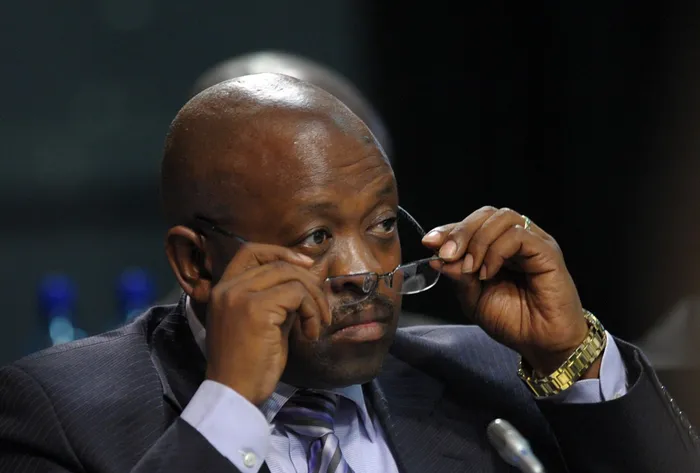Date set for commission probing criminal syndicates in SA police, NPA and intelligence

Former ConCourt judge Mbuyiseli Madlanga will lead a judicial probe into criminal syndicate infiltration of South Africa’s justice system, with hearings starting 1 September 2025.
Image: Dumisani Sibeko/Independent Newspapers
Former Constitutional Court (ConCourt) judge Mbuyiseli Madlanga’s judicial commission of inquiry is set to begin public hearings into explosive allegations of criminal syndicates infiltrating South Africa’s law enforcement and justice system.
The first hearing of the Commission of Inquiry into Criminality, Political Interference and Corruption in the Criminal Justice System will take place on 1 September 2025.
The Commission of Inquiry into Criminality, Political Interference and Corruption in the Criminal Justice System confirmed this week that it has finalised its venue and is preparing to commence its work as scheduled.
In a statement released on Thursday, the Commission announced: “The Commission of Inquiry into Criminality, Political Interference and Corruption in the Criminal Justice System is pleased to announce that its hearings will commence on 1 September 2025. It is expected that the first hearing will be held in public.”
After considering several locations in Gauteng, the Commission has selected the Bridgette Mabandla Justice College in central Pretoria as its official seat.
The venue, which will host both its offices and hearings, has been made available at no cost. “The Commission also confirms that, having explored and considered several options in Gauteng, it has determined that its office will be located at the Bridgette Mabandla Justice College in central Pretoria,” the statement read.
“The venue is available to the Commission free of charge. The Commission’s hearings will be held at this venue.”
Preparations are already underway to ensure the space is ready. “The Department of Justice and Constitutional Development, which is assisting with procuring the Commission’s requirements, is hard at work to ensure that hearings will commence as scheduled. Likewise, the Department of Public Works and Infrastructure is attending to alterations that will make the venue fit for purpose,” the Commission said.
President Cyril Ramaphosa established the Commission by proclamation on 23 July 2025, in terms of section 84(2)(f) of the Constitution.
Its mandate stems from a shocking media briefing held on 6 July by KwaZulu-Natal Provincial Police Commissioner Lieutenant General Nhlanhla Mkhwanazi. At that briefing, Mkhwanazi publicly raised serious concerns about the existence of what he described as “a sophisticated criminal syndicate” operating within state structures.
He alleged that this network had “infiltrated law enforcement and intelligence structures in South Africa,” resulting in the systematic undermining of the country’s criminal justice system.
The official proclamation states that these allegations “raise serious constitutional, security and rule-of-law concerns, necessitating an urgent and comprehensive investigation.”
In response, the Commission has been instructed to investigate and report on “the veracity, scope, and extent of the allegations with regard to the infiltration of law enforcement, intelligence and associated institutions within the criminal justice system by criminal syndicates and make findings and recommendations for criminal prosecutions, disciplinary actions and institutional reform.”
Specifically, the Commission must examine whether criminal syndicates, including drug cartels, have infiltrated or exercised undue influence over the South African Police Service (including its Crime Intelligence division and the Political Killings Task Team), metropolitan police departments in Johannesburg, Ekurhuleni and Tshwane, the National Prosecuting Authority, the State Security Agency, the Department of Correctional Services, members of the judiciary, and other organs of state connected to the criminal justice system.
The Commission is also tasked with uncovering the nature and consequences of this infiltration. This includes probing whether it has facilitated organised crime, manipulated investigations, induced criminal conduct among law enforcement leadership, resulted in further criminal acts, or led to the intimidation or victimisation of whistleblowers and witnesses.
The Commission must further assess whether senior officials or members of the national executive aided or abetted this criminal activity, failed to act on intelligence, or personally benefitted, financially or politically.
In terms of its powers, the Commission has been granted wide-reaching authority under the Commissions Act of 1947. It may summon witnesses, compel the production of documents, and conduct search-and-seizure operations where necessary. Importantly, it may also sit in camera to protect witness safety or the integrity of intelligence operations.
“The Commission shall have all the powers necessary to achieve its mandate,” the proclamation states, including “the power to refer matters for immediate criminal investigation and urgent decisions on prosecution, taking into account the nature of the allegations and evidence the Commission will uncover.”
The Commission must also refer any relevant matters to appropriate law enforcement agencies, government departments or regulators for prosecution, further investigation or the establishment of a separate inquiry.
Madlanga is expected to submit an interim report within three months of the Commission’s establishment and a final report within six months, unless the President extends the timeline.
These reports must be submitted to the President and will include recommendations that can be “immediately actioned.” The final report will also be delivered to the Speaker of the National Assembly and the Chief Justice.
The Commission has committed to ensuring the protection of witnesses and whistleblowers. While proceedings will generally be held in public, the Chairperson may direct that certain hearings be closed where safety or confidentiality demands.
hope.ntanzi@iol.co.za
Get your news on the go. Click here to join the IOL News WhatsApp channel.
IOL Politics
Related Topics: